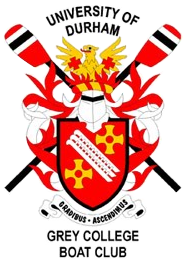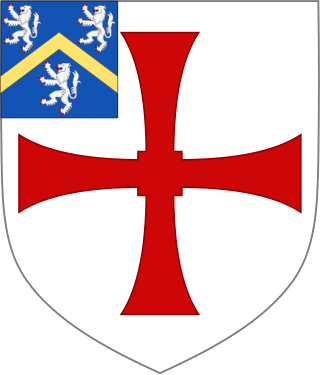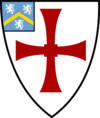
Durham is a cathedral city and civil parish in the county of Durham, England. It is the county town and contains the headquarters of Durham County Council, the unitary authority which governs the district of County Durham. It had a population of 48,069 at the 2011 Census.

University College, informally known as Castle, is a college of Durham University in Durham, England. Centred on Durham Castle on Palace Green, it was founded in 1832 and is the oldest of Durham's colleges. As a constituent college of Durham University, it is listed as a higher education institution under section 216 of the Education Reform Act 1988. Almost all academic activities, such as research and tutoring, occur at a university level.

Trevelyan College is a college of Durham University, England. Founded in 1966, the college takes its name from social historian George Macaulay Trevelyan, Chancellor of the university from 1950 to 1957. Originally an all-female college, the college became fully mixed in 1992.

St Cuthbert's Society, colloquially known as Cuth's, is a college of Durham University. It was founded in 1888 for students who were not attached to the existing colleges. St Cuthbert's Society is a Bailey college, based on Durham's peninsula next to the River Wear, although it also has other accommodation a few minutes' walk away in Old Elvet.

St Aidan's College is a college of the University of Durham in England. It had its origins in 1895 as the association of women home students, formalised in 1947 as St Aidan's Society. In 1961, it became a full college of the university, and in 1964 moved to new modernist buildings on Elvet Hill designed by Sir Basil Spence.

Van Mildert College is a college of Durham University in England. Founded in 1965, it takes its name from William Van Mildert, Prince-Bishop of Durham from 1826 to 1836 and a leading figure in the University's 1832 foundation. Originally an all-male college, it became co-educational in 1972 with the admission of female undergraduates.

Stephenson College is a college of the University of Durham in England.

John Snow College is a constituent college of Durham University. The college was founded in 2001 on the University's Queen's Campus in Stockton-on-Tees, before moving to Durham in 2018. The College takes its name from the nineteenth-century Yorkshire physician John Snow, one of the founders of modern epidemiology.

The Bailey is a historic area in the centre of the city of Durham, County Durham, England. It consists of two streets, North Bailey and South Bailey. It is on a peninsula within a sharp meander along the River Wear, formed by an isostatic adjustment of the land. The name "The Bailey" derives from the outer bailey of the Norman motte and bailey-style Durham Castle. Vehicular access to the area is restricted by the Durham City congestion charge, which started in 2002 and is the UK's oldest such scheme.

Josephine Butler College is a constituent college of Durham University. The college was opened in 2006. It is named after Josephine Elizabeth Butler, a 19th-century feminist and social reformer who had a significant role in improving women's public health and education in England. Butler's father was the cousin of the 2nd Earl Grey, after whom Grey College, Durham is named.

Elvet is an area of the city of Durham, in County Durham, in England. It is situated on the opposite side of the River Wear from Durham Cathedral and forms the south-eastern part of central Durham. Elvet is currently unparished. Historically, the word elvet means "swan" or "swan-stream", from the Old English elfetu or ilfetu. The Swan and Three Cygnets, a public house on Elvet Bridge, is a reminder of the historical name given to this part of the city.
Belmont Community School is a comprehensive school in Belmont, County Durham, England.

The Colleges of Durham University are residential colleges that are the primary source of accommodation and support services for undergraduates and postgraduates at Durham University, as well as providing a focus for social, cultural and sporting life for their members, and offering bursaries and scholarships to students. They also provide funding and/or accommodation for some of the research posts in the University. All students at the University are required to be members of one of the colleges.
The Durham–Sunderland line was a railway line in the North East of England. The line no longer exists, but many features along its path are still visible.

Grey College Boat Club (GCBC) is the rowing club of Grey College at Durham University in North East England.

The history of Durham University spans over 190 years since it was founded by Act of Parliament. King William IV granted royal assent to the Act on 4 July 1832, and granted the university a royal charter on 1 June 1837, incorporating it and confirming its constitution. The university awarded its first degrees on 8 June 1837. It describes itself as the third-oldest university in England and is listed by the European University Association as one of Europe's oldest hundred universities in continuous operation.

Durham University is a collegiate public research university in Durham, England, founded by an Act of Parliament in 1832 and incorporated by royal charter in 1837. It was the first recognised university to open in England for more than 600 years, after Oxford and Cambridge, and is thus, following standard historical practice, the third-oldest university in England. As a collegiate university, its main functions are divided between the academic departments of the university and its 17 colleges. In general, the departments perform research and provide teaching to students, while the colleges are responsible for their domestic arrangements and welfare.

The Department of Music is the music school of the University of Durham.

South College is a college of Durham University, which accepted its first students in autumn 2020.






















